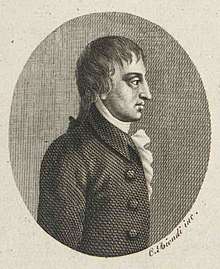Buovo d'Antona (Traetta)
Buovo d'Antona is an Italian-language dramma giocoso opera in 3 acts by Tommaso Traetta, on a libretto by Carlo Goldoni based on the Bevis of Hampton chivalric tale, which premiered at the Teatro San Moisè, Venice on 27 December 1758.[1] The opera was well received and staged in Bologna, Turin, Verona, Palma de Majorca, Barcelona, Seville and finally Dresden in 1772.[2] Antonio Zatta's Venetian edition of Goldoni's plays (1788–95) gives "1750" as the date for a Florence premiere of the opera, but this is now thought to be a mistake.[3]
| Tommaso Traetta |
|---|
 |
|
Operas
|
Plot
The plot is largely the same as the traditional Buovo d'Antona chivalric tale, but with dramatic alterations by Goldini. The basic story of the return to Antona from exile of the knight Buovo (tenor) to reclaim his estates and his beloved Drusiana (soprano) from the usurper Maccabruno (castrato) remains.[4] Romantic conflict occurs in the wavering affections of Drusiana for her former lover and the usurper, and her new rival for the affections of Buovo in Menichina (contralto), a miller's daughter. Comic incidents occur around Buovo's friend Striglia (tenor), and his sweetheart the garden maid Cecchina (soprano), as well as interventions by Menichina's father the miller Capoccio (tenor). The plot concludes with Buovo reclaiming his estates, but marrying the miller's daughter while Drusiana is held to her earlier decision to be married to Maccabruno, despite Buovo having returned before the three years grace she originally required.
Traetta responded to the conventional division of heroic and comic characters in Goldoni's libretto with music suitable for opera seria for the noble couple, Buovo and Drusiana - then Buovo and Menichina, such as ABA da capo arias, and with more lightweight AABB arias for the non-noble couple, Striglia and Cecchina, and the other buffo roles.
Recordings
- Buovo d'Antona Howard Crook (Buovo d'Antona); Daniela del Monaco (Menichina), Orchestra of the Teatro la Fenice, Venice Alan Curtis recorded 1993, 2 CDs, Opus 111
References
- Willem Pieter Gerritsen, Anthony G. Van Melle A Dictionary of Medieval Heroes: Characters in Medieval Narrative 0851157807 - 2000 " Tomasso Traetta's opera Buovo d'Antona, to a libretto by Carlo Goldoni, was premiered in Venice in 1758. "
- Essay by Denis Morrier in booklet to 1993 recording
- Annals of Opera, 1597-1940 1955 Page 1763 "In the Zatta edition of Goldoni's plays it is stated (Vol. xli, 1794) that Buovo d'Antona was first produced at Florence in 1750 (without mentioning a composer). Consequently, the date of 1750 (sometimes misprinted as 1756) for the production of for the production of Traetta's opera has been taken over by Florimo, Wotquenne, Dent and many others. But as long as a (possibly misprinted) date, given so many years after the vogue of the opera was over, remains the only evidence for a production in 1750, it seems to be safer to adopt the date of the earliest extant libretto, it seems to be safer to adopt the date of the earliest extant libretto (which mentions Traetta as the composer)...."
- Fanfare Volume 18, Issue 5 1995 p.364 "The opera tells of a knight (Buovo) who has been exiled from his native city of Antona by the usurper Maccabruno. The latter has not only confiscated Buovo's estates but his fiancee. Drusiana, as well. At least she would like to accede to Maccabruno's wooing but she feels some guilt about abandoning her exiled fiance. She promises that if Buovo doesn't turn up alive within a period of three years she will become Mrs. Maccabruno."